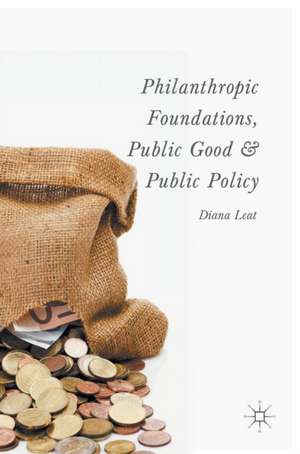Philanthropic Foundations, Public Good and Public Policy
Autor Diana Leaten Limba Engleză Hardback – 23 iun 2016
Preț: 638.43 lei
Preț vechi: 751.10 lei
-15% Nou
Puncte Express: 958
Preț estimativ în valută:
122.20€ • 132.78$ • 102.72£
122.20€ • 132.78$ • 102.72£
Carte tipărită la comandă
Livrare economică 21 aprilie-05 mai
Preluare comenzi: 021 569.72.76
Specificații
ISBN-13: 9781137482884
ISBN-10: 1137482885
Pagini: 184
Ilustrații: IX, 185 p.
Dimensiuni: 148 x 210 x 18 mm
Greutate: 0.36 kg
Ediția:1st ed. 2016
Editura: Palgrave Macmillan UK
Colecția Palgrave Macmillan
Locul publicării:London, United Kingdom
ISBN-10: 1137482885
Pagini: 184
Ilustrații: IX, 185 p.
Dimensiuni: 148 x 210 x 18 mm
Greutate: 0.36 kg
Ediția:1st ed. 2016
Editura: Palgrave Macmillan UK
Colecția Palgrave Macmillan
Locul publicării:London, United Kingdom
Cuprins
Contents.- 1. Focus on Foundtions.- 2. Definitions and Distinctions.- 3. How Foundations Work: An Overview.- 4. From Charity to Change, Brussels to Beijing.- 5. Public Benefit or Playthings of the Rich?.- 6. Sources of Wealth and Income.- 7. Warehouses of Wealth: Payout and Perpetuity.- 8. Cash Machines or More?.- 9. Missing Measurement, Misunderstanding Measurement?.- 10. Foundations and Democracy: Threat or Promise?.- 11. Dark Corridors or Glass Pockets?.- 12. The Future is Monstrous?.-
Notă biografică
Diana Leat is Visiting Professor at CassBusiness School, London, UK, and at the Australian Centre for Philanthropy andNonprofit Studies, QUT Brisbane, Australia. She is author of over 120 articles and books on the non-profit sectorand social policy, and has held research posts in universities and think tanksin the UK, the US and Australia. Diana spent a year with the Carnegie Trustdeveloping the first research centre for philanthropy in the UK, and until itsclosure in 2013 was a trustee of the Diana, Princess of Wales Memorial Fund.
Textul de pe ultima copertă
Thisbook discusses a series of related but independent challenges faced byphilanthropic foundations, drawing on international, contemporary andhistorical data. Throughout the world,private philanthropic foundations spend huge sums of money for public goodwhile the media, policy-makers and the public have little understanding of whatthey do and why. Diana Leat considersthe following questions: Are philanthropic foundations more than warehouses ofwealth? Where does foundation money come from, and is there a tension between afoundation’s ongoing sources of income and its pursuit of public good? How arefoundations regulated and held accountable in society? Is there any evidencethat foundations are effective in what they do? Is it possible to have too muchphilanthropy? In posing these questions, the book explores some of the keytensions in how foundations work, and their place in democratic societies.









